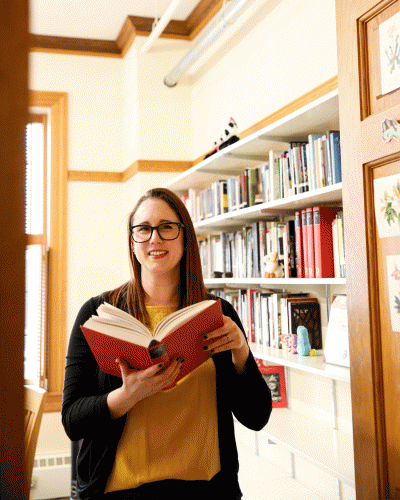Botanical entanglements expand our insights
Author of “Botanical Entanglements: Women, Natural Science, and the Arts in Eighteenth-Century England” (University of Virginia Press), Professor Sagal is an expert on 18th-century literature and science studies, women’s writing, and critical plant studies. She also teaches classes on science fiction, video games, and fan fiction.
Science studies is an act of decolonization

Academics discuss decolonizing the humanities, but true decolonization means more than citing Black, Indigenous, Hispanic, Asian, and other people of color scholars. It refers to a new way of thinking about how we study the field, and whose stories about scientific study we privilege over time. For example, some excellent recent scholarship features medical research and botanical bioprospecting, and their intersections with Indigenous and enslaved populations as a holistic subject, not one that has to be linked to whiteness or European science. This can support Cornell’s efforts to make diversity, equity, inclusion, and accessibility (DEIA) issues part of every class, not just speciality courses or programs.
Science studies is capacious
Scholarship on the history of science and its intersections with literature focuses on more than just chemistry or physics, or even how various disciplines pop up in literature. We can study watercolor paintings, dye-making journals, personal letters, apothecary recipes, and even dress patterns to learn about historical scientific labor beyond the famous published books. Moreover, with the inclusion of animal studies, insect studies, critical plant studies, queer studies, Indigenous studies, and various other critical methodologies, we expand our insights, our observations, and what we can share with our students.
Science studies can tell us more about our history
While generations of scholarship in the history of science focused on the famous white male thinkers of the 17th to 19th centuries, only recent decades addressed women’s participation in the sciences. Emerging scholarship (including my book) focuses on how reconceptualizing what we mean by “scientific labor” can show us that women were much more involved in scientific study than we previously thought. It wasn’t all white lab coats and beakers! This can also help advocacy efforts for increasing gender diversity in STEM fields.
Science studies will teach us more about literature
Studying the history of science isn’t just about focusing on texts with scientific components or influences. Knowing historical ideas about human biology can help us understand race relations in literature, which can then provide insight into the cultural context of literature that doesn’t even directly discuss race. Likewise, knowing about historical garden design can offer context for why descriptions of landscape can help us interpret characters and plot. Ultimately, this makes literature more interesting, accessible, and important to modern college students.
Science studies can link the past and present
New and forward-thinking scholarship in the history of science encourages us to think about not only the topics of concern from past scientific eras but also their ways of thinking about nature and the world. When we see colonial and enlightenment ideologies still influencing our environmental policy, we recognize that we need to shift our cultural way of engaging with nature in order for any real significant change to happen. People in the 18th century often saw the Earth and its resources as an inert backdrop for their own gain, not as something to be valued on its own. We need to change that attitude.
This story is part of a series on six faculty who offer expertise on the fields they are passionate about teaching.



